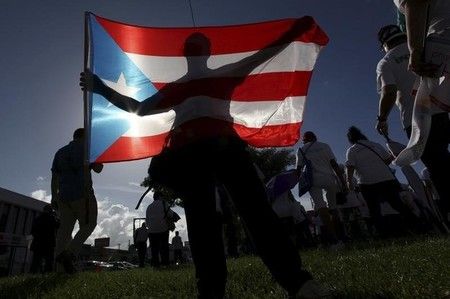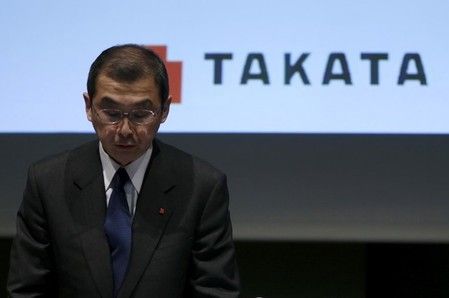Advertisement
Bipartisan Puerto Rico crisis bill introduced, debt looms

By Daniel Bases and Susan Heavey
NEW YORK/WASHINGTON (Reuters) – U.S. lawmakers on Thursday began coalescing around revised bipartisan legislation to help address Puerto Rico’s unpayable debt burden, which now threatens a full-blown humanitarian crisis.
Released close to midnight on Wednesday, the House Natural Resources Committee’s revised bill includes a strong oversight board to direct how and when the island pays its bills and leaves many earlier proposals in place.
Puerto Rico has already defaulted on some of its roughly $70 billion in debt while trying to cope with a 45 percent poverty rate among its 3.5 million U.S. citizens. In addition, it is reeling from a Zika virus outbreak that is hurting its critical tourism industry.
Language allowing Puerto Rico to cut repayments to creditors without their consent, known as a “cram-down,” remains. The bill does not prioritize pensioners over bondholders, but the language remains muddied, one analyst surmised.
“Tonight, we introduced legislation to responsibly address the crisis in Puerto Rico. The revised bill incorporates technical refinements and input from all stakeholders,” committee Chairman Rob Bishop said in a statement.
For a link to a factbox on the bill, click.
While both Republican and Democratic leaders of the U.S. House of Representatives welcomed the bill after several delays, how more conservative Republican lawmakers view the legislation is an open question.
A vote on the bill by the House is expected in the first week of June, ahead of a looming $1.9 billion debt payment due on July 1.
In recent months, the debt crisis has threatened a deepening humanitarian crisis as hospitals close wards, social services decline and emigration saps more economic activity.
“After long bipartisan negotiations, we believe we have achieved a restructuring process that can work,” U.S. House Democratic Leader Nancy Pelosi said in a statement on Thursday.
House Speaker Paul Ryan, who faces opposition to the bill from within his own Republican ranks, highlighted the bipartisan effort as he will need Democrat votes to get it passed.
“Right now, the stability of the U.S. territory is in danger, as the Puerto Rican government continues to default on major loan payments. We have insisted that our response meet basic principles, and first among them is protecting taxpayers from a bailout,” Ryan said in a statement.
PROMESA
The bill, formally known as the Puerto Rico Oversight, Management and Economic Stability Act (PROMESA), seeks to return the island to solvency, rebuild a base for economic growth and maintain its ability to access capital markets in the future.
The White House called the bill an “important first step” in creating a fair process for restructuring Puerto Rico’s debt and economy after a decade of recession.
The U.S. territory’s governor, Alejandro Garcia Padilla, said he was encouraged by the bill but chafed at the oversight board, which he believes undermine the island’s self-governance.
Choosing the members of the oversight board has been a sticking point in the talks leading up to the introduction of the bill.
U.S. Treasury Secretary Jack Lew said on Thursday he was pleased the bill includes “restructuring tools for Puerto Rico that are comprehensive and workable” but expressed disappointment that proposals to promote economic growth were left out of what he called a “tough bipartisan compromise.”
In the early drafts of the bill, Senator Orrin Hatch of Utah, the chairman of the powerful Senate Finance Committee, said he was not satisfied, meaning a potential hurdle for passing the bill could remain.
A conservative Tea Party favorite, Representative Raul Labrador of Idaho, said he was reviewing the bill but told Reuters he thought a majority of Republicans would “support it through both houses of Congress.”
Many creditors lobbied for a bill that does not create new precedents for how they might be treated in a restructuring which would potentially set up future legal fights on the U.S. mainland that are far away from the island’s current crisis.
“The bill, which creates a control board and allows for bankruptcy, is highly controversial and does not definitively protect any creditors. We believe the legislation is more positive for both GO and COFINA creditors than the legislation previously under review,” wrote Heights Securities analyst Daniel Hanson.
Hanson said the bill lacks clarity over the treatment of constitutionally protected bondholders versus pensioners.
A local bondholder group said it supported the bill. “As imperfect as it may be, the bipartisan bill is the ‘pause’ that is desperately needed so everyone can come together to forge a bright future for all Americans living in Puerto Rico,” said Jorge Irizarry, president of the Backyard Bondholders, which represents more than 60,000 resident bondholders in Puerto Rico.
GO, or General Obligation bonds are backed by the full faith and credit of the island and are senior to all debt, while COFINA debt is backed by sales tax revenues.
“This territories-clause bill, which will bring all creditors to the table and establish a strong and independent fiscal oversight board, should appeal to conservatives who were concerned about a ‘bailout’ or ‘contagion,'” the COFINA Senior Bondholders Ad Hoc Group said in a statement.
Investors bid up prices on Puerto Rico’s benchmark July 2035 GO debt to 66, a gain of 0.50 point in price to yield 12.797 percent, according to MSRB data.
(Reporting by Daniel Bases in New York and Susan Heavey in Washington; Additional reporting by Nick Brown in San Juan, Richard Cowan and Tim Ahmann in Washington; Editing by Clive McKeef and Jonathan Oatis)










